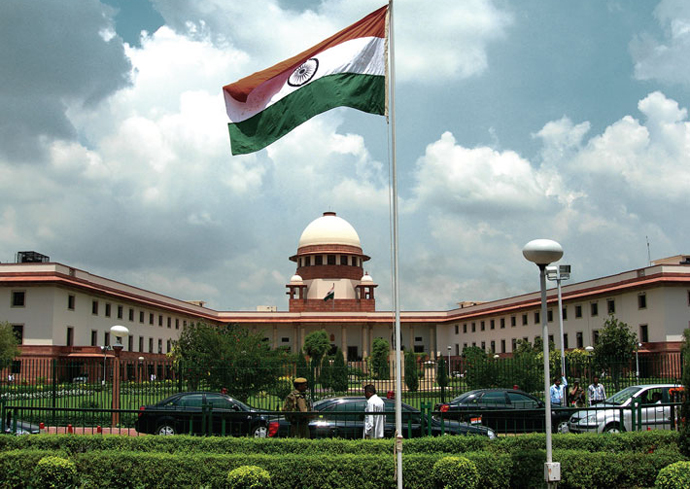Cong move SC against RS Chairman’s dismissal of impeachment notice against CJI
 NEW DELHI : Congress Rajya Sabha Parliamentarians Pratap Singh Bajwa and Amee Harshadray Yajnik on Monday approached the Supreme Court challenging Vice-President M Venkaiah Naidu’s decision to dismiss the Opposition’s impeachment motion against Chief Justice of India (CJI) Dipak Misra. Rajya Sabha members challenged Vice-President and Rajya Sabha Chairman M. Venkaiah Naidu’s April 23 decision to reject the notice of motion for removal of Chief Justice of India (CJI) Dipak Misra by Opposition MPs for “abuse of power and forgery.”
NEW DELHI : Congress Rajya Sabha Parliamentarians Pratap Singh Bajwa and Amee Harshadray Yajnik on Monday approached the Supreme Court challenging Vice-President M Venkaiah Naidu’s decision to dismiss the Opposition’s impeachment motion against Chief Justice of India (CJI) Dipak Misra. Rajya Sabha members challenged Vice-President and Rajya Sabha Chairman M. Venkaiah Naidu’s April 23 decision to reject the notice of motion for removal of Chief Justice of India (CJI) Dipak Misra by Opposition MPs for “abuse of power and forgery.”
Naidu had on April 23 rejected the notice by seven Opposition parties, led by the Congress, to impeach the chief justice of India on five grounds of “misbehaviour”, saying the allegations were neither “tenable nor admissible”. The Congress had slammed his order as “hasty, illegal and ill-informed”.
In their prayer before the apex court, they sought a quashing of Naidu’s order, directing an enquiry into the matter under the Judges Inquiry Act, and forming a committee for the investigation. MPs Partap Singh Bajwa and Dr. Amee Harshadray Yajnik, represented by advocate Sunil Fernandes, on Monday alleged that Mr. Naidu acted in a “cavalier” manner by refusng to admit the notice of motion signed by over 50 MPs.
The petition was mentioned before a Bench of Justices J. Chelameswar and S.K. Kaul by senior advocate Kapil Sibal for early hearing.The petition was mentioned before the Chelameswar Bench because the removal motion is against the CJI, who is presiding over the Bench in the court next door.The Bench said it would consider the petition after discussion.
Mr. Naidu had no business to act like a quasi-judicial authority, assume the mantle of the inquiry committee and dismiss the motion on merits, the petition said.The two MPs, who are signatories to the notice of motion, alleged that Mr. Naidu acted in a mannet “ex-facie illegal, arbitrary and violative of Article 14.”
“The impugned order is in the teeth of the constitutional mandate of Article 124(4) and 124(5) and the provisions of the Judges Inquiry Act. None of the reasons given by the Chairman in the order carry any weight or are legally tenable. It deserves to be set aside for being wholly extraneous and ultra vires to the provisions of the Constitution of India and the Inquiry Act,” the petition said.
The order discussed only one of the five charges levelled by the MPs against the CJI, ie, the CJI abused his position as the Master of the Roster, it said.“It is submitted that it is not the Chairman’s prerogative to adjudicate whether there has been any abuse by the Hon’ble CJI of his power as the Master of the Roster. This is the job of the Inquiry Committee,” the petition said.
“The order cites judicial authorities and goes into an impermissible arena of quasi-judicial determination of Charge No.5 which is impermissible and illegal,” it said. he order was “cavalier, cryptic and abrupt manner, shockingly holds that none of the other charges are made out without disclosing as to on what basis was this finding retuned,” it said. “The charges contained in the notice of motion are extremely serious and merit a full-fledged inquiry to test their veracity. It cannot be adjudicated in a summary whimsical manner as the order has sought to do,” the MPs said.
On this short ground itself, the impugned order deserves to be set aside, said their plea. The five charges against the CJI includes alleged acts and circumstances relating to the Prasad Educational Trust case showing “prima facie evidence suggesting that Chief Justice Dipak Misra may have been involved in the conspiracy of paying illegal gratification in the case, which at least warrants a thorough investigation.”
The petition listed that the CJI dealt on the administrative as well as judicial side, with a writ petition that sought investigation into a matter in which he too was likely to fall within the scope of investigation since he had presided over every bench which had dealt with the case and passed orders in the case of Prasad Educational Trust, and thus violated the first principle of the Code of Conduct for Judges.
That Chief Justice Misra “appears to have antedated an administrative order dated 6th November 2017 which amounts to a serious act of forgery/fabrication.”The petition said, “That Chief Justice Dipak Misra acquired land when he was an advocate, by giving an affidavit that was found to be false and despite the orders of the ADM cancelling the allotment in 1985, surrendered the said land only in 2012 after he was elevated to the Supreme Court.
The fifth and final charge being that the CJI “abused his administrative authority as master of roster to arbitrarily assign individual cases of particular advocates in politically sensitive cases, to select dges in order to achieve a predetermined outcome.”The petition said the removal was rejected despite “clear, tenable and cogent charges” and the Chairman did not form a three-member inquiry committee as contemplated under Section 3(2) of the Judges Inquiry Act.(With Agency Inputs ).

